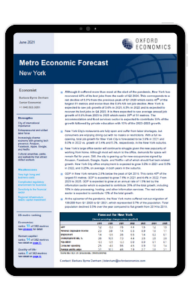US | Metro Economic Forecast: New York

Although it suffered more than most at the start of the pandemic, New York has recovered 45% of its lost jobs from the nadir of Q2 2020. This corresponds to a net decline of 9.9% from the previous peak of Q1 2020 which ranks 45th of the largest 51 metros and worse than the 5.6% US net job decline. New York is expected to see job growth of 3.6% in 2021, 6.5% in 2022 and is expected to recover its lost jobs in Q4 2022. It is then expected to see average annual job growth of 0.6% from 2023 to 2025 which ranks 28th of 51 metros. The accommodation and food services sector is expected to contribute 33% of the growth followed by private education with 13% of the 2023–2025 growth.
What you will learn:
- New York City’s restaurants are fully open and suffer from labor shortages, but consumers are enjoying dining out with no masks or restrictions. With a full re-opening, total job growth for New York City is forecasted to be 3.9% in 2021 and 8.0% in 2022 vs. growth of 3.4% and 5.2%, respectively, in the New York suburbs.
- New York’s large office sector will continue to struggle given the new popularity of working from home. Although most will return to the office, demands for space will remain flat for years. New York City office employment is expected to grow 3.0% in 2021 and 5.5% in 2022, and 3.25%, on average, in both years in the suburbs.
- GDP in New York remains 2.8% below the peak of Q4 2019. This ranks 45th of the largest 51 metros. GDP is expected to grow 7.6% in 2021 and 4.4% in 2022.
Tags:
Related Services

Post
UK: Supply constraints are probably less prominent in the south
The extent to which UK employers can respond to likely 2024 interest rate cuts with increased output, rather than rises in prices and wages, will partly reflect the extent of spare capacity. This will inevitably vary by region. Evidence on this is imperfect, but in terms of capital assets (including intangibles) and labour availability, southern regions appear to be in a stronger position than those in the UK's traditional industrial heartland.
Find Out More
Post
Global Private equity real estate fund maturities spur asset sales
We expect the significant increases in fund maturities, spurred by capital raised over the past decade, to exert upward pressure on the rate of asset disposals as the funds approach the end of their lifecycles.
Find Out More